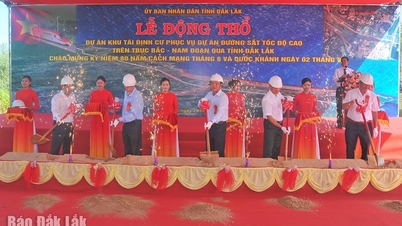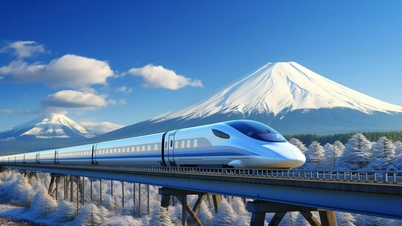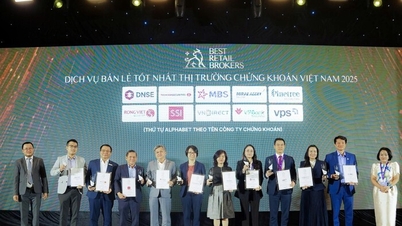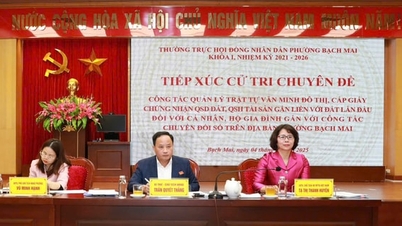The Ministry of Finance proposed to assess the feasibility
As reported by VietNamNet , the Ministry of Construction has just completed the Draft Resolution on a number of specific mechanisms and policies applicable to the North-South high-speed railway project. The draft document has been sent to the Ministry of Justice for appraisal.
Accordingly, the Ministry of Construction has proposed a series of financial support mechanisms, tax incentives and separate regulations for projects implemented in the form of public-private partnerships.
Regarding the policy of the State lending a maximum of no more than 80% of the total project investment, in the Draft Resolution Submission, the Ministry of Construction said that, to ensure the project's finance in the form of business investment, synthesizing the opinions of a number of investors (Vinspeed Company, Thaco Company) that the Ministry received, in which it proposed that the State re-lend from the budget with a loan limit of 80% of the total investment (excluding site clearance), 0% interest rate within 30 years; the remaining 20% of the capital will be mobilized by the investor himself.
According to the Law on Public Debt Management 2017, there is currently no mechanism for the Government to use state budget capital to re-lend to enterprises, so according to the opinion of the Ministry of Finance, it is necessary to report to competent authorities for consideration and decision.

The Ministry of Construction also cited the opinion of the Ministry of Finance on this issue. Accordingly, the Ministry of Finance believes that the proposal for the Government to lend to project owners at an interest rate of 0% for a period of (no more than) 30 years is equivalent to the Government having to pay the interest on the loan. This will increase the direct interest payment obligation of the Government/total state budget revenue, potentially exceeding the ceiling, negatively affecting the national credit rating.
In addition, 0% interest rate weakens the ability to recover capital and reduces the motivation of enterprises to repay debt. When enterprises have no pressure to repay debt (because the State budget pays interest), it will lead to difficulty in debt recovery, which is not consistent with the principle of market-oriented debt management.
According to the proposed special mechanism, the investor is responsible for repaying the entire loan at once when the loan term expires, which is very risky. Therefore, the Ministry of Finance requested the Ministry of Construction to evaluate the feasibility of this option when the total loan demand is very large, however, the actual ability to recover capital is very difficult to ensure if the project is slow to recover or does not achieve the expected financial efficiency.
In order to encourage private enterprises to participate in project investment, the Ministry of Construction has compiled proposals from a number of investors for ministries and branches to review, evaluate, and develop policy mechanisms.
“The content of the policy is related to the financial sector, the Ministry does not have the function, expertise, or information, so it cannot assess the impacts of this policy on the macro economy,” the Ministry of Construction admitted. Therefore, with the above information, the Ministry does not have the basis to synthesize a report for the Government to consider this policy mechanism.
Payback period for investors is about 33.61 years
Regarding the policy of the State capital participation rate not exceeding 80% of the total project investment in the case of projects implemented under the public-private partnership (PPP) investment method, the Ministry of Construction has studied the international experience of 27 investment projects in the railway sector under the PPP method in the world. Thereby, it shows that some countries have to raise the level of State support for PPP projects to a very high level.
In addition, the Preliminary Project Feasibility Study Report has calculated that in case the PPP investor invests in initial operating vehicles and equipment of 6.57 billion USD (about 9.7% of the total project investment including site clearance costs) and continues to invest in additional vehicles of about 13.31 billion USD during the exploitation process, the State supports to compensate for losses in the initial exploitation period of about 0.78 billion USD (through ticket price support), the results show that the payback period for the investor is about 33.61 years.
In case of a 5% decrease in revenue, the payback period for the investor is about 41.18 years and the State needs to support 1.05 billion USD. In case of a 10% decrease in revenue, the investor cannot be paid back.
The Ministry of Construction also cited the regulation that for PPP projects, the State capital ratio applied shall not exceed 70% of the total preliminary investment and total investment of the project. The project is very large in scale, technically complex, serving mainly social security, national defense and security, so the economic and financial efficiency is not high.
To ensure the financial efficiency of the project as well as attract private investors to participate in this form, it is necessary to study increasing the level of State support. The Ministry of Construction received a policy proposal that "the State capital participation rate should not exceed 80% of the total approved project investment".
Regarding tax incentives, according to the Ministry of Construction, current laws stipulate a list of domestically produced goods, but there are no regulations on goods that can be produced but do not meet demand. However, due to the specific nature of the project, there must be a superior policy mechanism on import tax on machinery and equipment that cannot be produced domestically.
Based on consultation with the Ministry of Industry and Trade, the Ministry of Construction proposed the policy: “Investors are exempted from import tax on machinery, equipment, railway transport vehicles to create fixed assets and imported goods, components, materials, spare parts serving investment in construction, renovation, upgrading, maintenance, exploitation of railway infrastructure and other materials and equipment directly serving the project that cannot be produced domestically, or can be produced but do not meet the technical standards of the project”.

Source: https://vietnamnet.vn/duong-sat-toc-do-cao-bac-nam-bo-xay-dung-noi-ve-de-xuat-vay-von-lai-suat-0-2458937.html


![[Photo] The road connecting Dong Nai with Ho Chi Minh City is still unfinished after 5 years of construction.](https://vphoto.vietnam.vn/thumb/1200x675/vietnam/resource/IMAGE/2025/11/04/1762241675985_ndo_br_dji-20251104104418-0635-d-resize-1295-jpg.webp)
![[Photo] Panorama of the Patriotic Emulation Congress of Nhan Dan Newspaper for the period 2025-2030](https://vphoto.vietnam.vn/thumb/1200x675/vietnam/resource/IMAGE/2025/11/04/1762252775462_ndo_br_dhthiduayeuncbaond-6125-jpg.webp)
![[Photo] Ca Mau "struggling" to cope with the highest tide of the year, forecast to exceed alert level 3](https://vphoto.vietnam.vn/thumb/1200x675/vietnam/resource/IMAGE/2025/11/04/1762235371445_ndo_br_trieu-cuong-2-6486-jpg.webp)
![[Photo] Ho Chi Minh City Youth Take Action for a Cleaner Environment](https://vphoto.vietnam.vn/thumb/1200x675/vietnam/resource/IMAGE/2025/11/04/1762233574890_550816358-1108586934787014-6430522970717297480-n-1-jpg.webp)







































































































Comment (0)